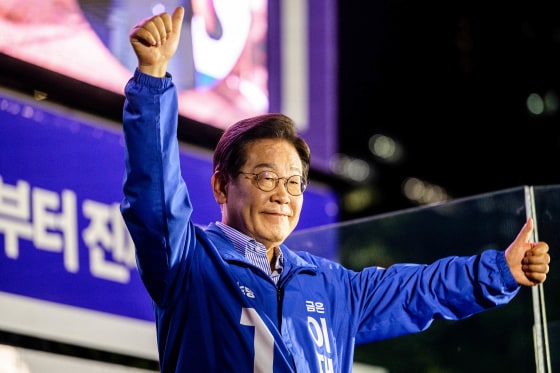Lee Jae-myung's Journey to the Presidency

On June 4, 2025, Lee Jae-myung (이재명) ascended to the presidency after his third attempt, which included participation in the Democratic Party's (더불어민주당) presidential primaries. Born in 1963 in Andong, North Gyeongsang Province, he is the fifth of seven siblings. After completing elementary school, his family moved to Seongnam, Gyeonggi Province, where financial struggles prevented him from attending middle school. Instead, he took a job at a factory in the Seongnam Sangdaewon Industrial Complex, using someone else's name to secure employment, a move he later referred to as the 'original disguise employment.'
For six years, he worked as a child laborer across six different factories. During an accident at a factory that produced baseball gloves, his left forearm was crushed, leading to a permanent disability that exempted him from military service. During this challenging period, he reportedly attempted suicide twice but was saved by pharmacists who secretly provided him with digestive medicine instead of sleeping pills.
Determined to improve his situation, Lee began studying for the high school equivalency exam after discovering that a factory supervisor had a high school diploma. He passed the middle school equivalency exam in 1978 and the high school exam in 1980. Motivated to pursue higher education, he devised a strategy to stay awake while studying for college entrance exams by spreading thumbtacks on his desk.
In 1982, he enrolled in Chung-Ang University (중앙대학교) Law School on a full scholarship, receiving a monthly stipend of 200,000 won. He graduated in 1986 and passed the 28th National Judicial Examination. Although he achieved scores that qualified him for a position as a judge or prosecutor, he chose to become a lawyer, influenced by a sense of guilt for not participating in student movements during his university years and a lecture by former President Roh Moo-hyun (노무현), which inspired him to become a human rights lawyer. He lied to his mother, who hoped he would become a judge, claiming he did not have the necessary grades.
After completing his legal training in 1989, he opened a law office in Seongnam and also served as the head of labor counseling centers in Icheon and Gwangju. He began his dual career as a lawyer and civic activist, exposing corruption in the Seongnam Bundang Parkview preferential allocation case and leading efforts to establish a municipal hospital. His political aspirations grew when he proposed a municipal hospital establishment ordinance, which was rejected by the city council in just 47 seconds, leading to protests and a warrant for his arrest. He later recounted hiding in a church basement, ultimately deciding to run for mayor to build the hospital himself.
Lee joined the Open Our Party (열린우리당), the predecessor of the Democratic Party, in 2005. After losing the Seongnam mayoral election in 2006 and the Gyeonggi Seongnam Bundang Gap parliamentary election in 2008, he was elected mayor of Seongnam in 2010 on his third attempt. Reelected in 2014, he gained national recognition for implementing three major welfare policies: youth dividends, free school uniforms, and free postpartum care. In 2016, he became a prominent figure in the political landscape by being one of the first to call for the resignation of then-President Park Geun-hye (박근혜) during the impeachment crisis.
In 2017, he ran in the Democratic Party's presidential primary, receiving strong support from his fan club, the 'Finger Revolution Army,' but finished third behind former President Moon Jae-in (문재인) and former Chungcheongnam-do Governor Ahn Hee-jung (안희정). However, he solidified his position as a future presidential candidate. In 2018, he was elected governor of Gyeonggi Province, further elevating his political stature.
Before the 2022 presidential election, Lee was considered a non-mainstream politician within the Democratic Party due to his aggressive stance against Moon during the 2017 primaries, which earned him the ire of pro-Moon factions. After facing political attacks from these factions following Moon's inauguration, he managed to expand his support base while serving as governor. In the 2022 presidential primaries, he defeated former Prime Minister Lee Nak-yon (이낙연) to become the Democratic Party's candidate. Although he narrowly lost to former President Yoon Suk-yeol (윤석열) by 0.73%, he quickly won a by-election for the Incheon Gyeyang constituency and was elected as the party leader with 77.77% of the vote at the Democratic Party's convention in August of that year.
In the April 2023 general election, he appointed many pro-Lee candidates, which drew criticism from opposition factions who labeled it as 'pro-Lee favoritism.' Despite a temporary dip in approval ratings for the Democratic Party, they achieved a significant victory, securing 175 seats. After stabilizing the party's internal conflicts, Lee was re-elected as party leader in August 2023 with an overwhelming 85.4% of the vote, marking the first consecutive term for a Democratic Party leader since former President Kim Dae-jung (김대중).
Throughout his political career, Lee has faced various criminal trials that have threatened his political future. However, he has consistently managed to turn the outcomes in his favor, enhancing his political influence. In 2019, while serving as governor, he was fined 3 million won for violating election laws, a ruling that was overturned by the Supreme Court the following year. The decision was closely contested, with a 7-5 split among justices. In September 2023, a vote in the National Assembly to approve a warrant for his arrest passed with 'rebellious votes' from within the Democratic Party, but the court denied the arrest warrant. As of recently, he has been involved in five criminal trials, and although a Supreme Court ruling on an election law violation was sent back with a guilty finding, he was elected president before the sentence was finalized.
What do you think?
0 reactions





